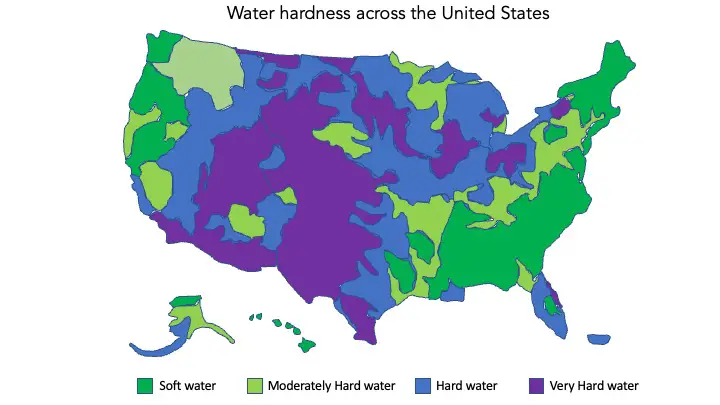Brita water filters do not soften water. Brita filter pitchers, bottles and faucet filters use carbon cartridges to improve taste, odor, and remove heavy metals. However, they cannot remove dissolved salts like calcium and magnesium. The Brita PRO Home system can be used to soften water.
While tap water supply in the United States is better than most other countries, most states have hard water. Well water (and water from underground aquifers) is also frequently hard and requires filtration before consumption. However, not all Brita water filters can soften hard water.
To understand why Brita filters don’t soften water, let’s first look at what hard water is. I’ll also lead you through how you can soften water, and what Brita filters are actually useful for.
What Is Hard Water, really?
Water hardness refers to the concentration of dissolved calcium and magnesium in water. The harder the water, the more magnesium and calcium salts it contains. The Environmental Protection Agency (EPA) defines a calcium carbonate concentration in water of 61-120 mg/L as moderately hard, 121-180 mg/L as hard, and above 180 mg/L as very hard.
Naturally hard water is formed as a result of water passing through mineral rocks underground, like in the case of wells and aquifers. In fact, the tap water in Arizona, Colorado, California, Kansas, Montana, New Mexico, Oklahoma, Texas, Utah and Wyoming are all sourced from hard water.

Hard water does not lather easily and feels slimy to the touch. It also leaves a scaly buildup on appliances, plumbing, furniture, and household items.
In contrast, softened water contains low concentrations of magnesium and calcium. Softened water does not leave any scaly deposits, and lathers easily. Rainwater is naturally soft.
Do Brita Filters Soften Hard Water?
Conventional Brita filters like the faucet filters, filter pitchers, dispensers, and water bottles do not significantly soften hard water. These Brita products mainly use activated carbon cartridges to filter water.
Carbon filters work on the principle of adsorption – where contaminants stick to the surface of the carbon like iron sticks to a magnet.
Adsorption is effective only in removing contaminants like heavy metals and volatile organic compounds. Chlorine compounds can also be filtered out in carbon filters through a chemical reaction – redox.
These carbon filters effectively filter out lead, mercury, benzene, cadmium, asbestos, chlorine (taste and odor) zinc, bisphenol, and other chemicals. However, they are ineffective when it comes to filtering out calcium and magnesium salts (sulfates, chlorides and carbonates).
Brita does not make any claim to soften water through their conventional filters (Standard, EliteTM, or Stream). Although Brita does use an ion exchange filter, their filters can remove metals like cadmium and copper. The same mechanism does not work with calcium and magnesium, which are the main minerals that make water hard.
Therefore, running hard water through a Brita filter will not soften your water.
However, the Brita PRO in-home system can soften water. There’s more information about this system further down this post.
Using Hard Water In Brita Filters
Hard water can be used in a Brita filter. However, the calcium and magnesium ions in hard water will form scale deposits overtime. Scale (or limescale) can buildup on the filter and inside the filter housing area of the Brita pitcher, bottle and dispenser. The filtration device may be carefully cleaned and the scale removed, however, the mineral damage to the filter is permanent and must be replaced.
Use of hard water through a conventional filter typically requires more frequent filter changes than normally recommended by the manufacturer.
So it is not advisable to run very hard water through a conventional Brita filter in the long run.
How To Soften Hard Water
Water can be chemically softened using ion exchange resins. Ion-exchange resin beads are typically placed in special ion-exchange columns, and exchange the calcium and magnesium in hard water with sodium and potassium salts, making the water softer. Ion-exchange columns usually come with two tanks – the resin tank and the brine tank. The brine tank refills the resin tank with enough sodium to replace the hard water ions.
Since ion exchange uses common salt (with sodium ions) to soften water, you must replace the salt in the brine tank often.
Depending on the type of water you have, you can also soften hard water at home. Water with dissolved calcium bicarbonate is said to be temporarily hard – that is, it can be softened just by boiling the water.
However, boiling this water causes the salt to form a crusty layer of limescale – which is what leads to scaly buildups.
Permanently hard water has dissolved calcium sulfate that cannot be removed by boiling.
You can use RO purifiers to partially reduce water hardness, because RO filtration effectively removes the most dissolved impurities in water. Distillation can also be used as an effective softening method.
What About Water Conditioners?
Some softeners claim to be salt-free because a high concentration of sodium in water (after the softening process) can be detrimental to health. However, salt-free ‘softeners’ only condition the water – they DO NOT actually remove any minerals or alter hardness. They merely prevent scaly buildups by inactivating salt molecules.
For instance, an electric/magnetic water softener passes a current or a magnetic field through the water to break down the dissolved salt molecules, thereby preventing scaling.
Salt-free conditioners like TAC (template-assisted crystallization) or NAC (nucleation-assisted crystallization) systems change mineral salts to crystals so that they do not form scales. This does not alter the hardness of the water.
Is There A Special Brita Filter To Soften Water?
The Brita PRO Home Water Softening System can be used to soften water at home.
When you sign up for a Brita PRO system, your home water usage is profiled for four weeks to predict the right amount of water you’ll need to be softened at any given time. Then a specific plan is recommended for you. This filtration plan accounts for removing lead, chlorine, particulate matter, and other contaminants present in your supply.
If your water profile indicates hard water, an in-home system with an ion-exchange softener will be installed to soften water.
This softener is certified the NSF/ANSI 44 Standard.
It has a programmable head to regulate ion exchange, ensuring you have soft water at all times. You can also adjust the filter to optimize the brine tank refill process. This filter comes attached with additional filters according to your home water needs.
The Best Brita Filter For Hard Water
Brita filter pitchers, bottles, dispensers and faucet filters are not recommended for very hard water. These filters do not soften water and the scale buildup caused by hard water can require more frequent filter changes. However, the Brita PRO home filters can be used to soften hard water and make it fit for consumption.
Do Brita Water Filters Make Water More Alkaline?
Brita filters do not make water more alkaline. Brita filter pitchers, bottles, dispensers and faucet filters do not alter the pH of water. Neutralizing filters and solutions, and water ionizers are the only methods that can increase the alkalinity of water.
The alkalinity of water refers to its ability to neutralize acid and is measured with its pH value. According to the EPA, drinking water must ideally have a pH between 6.5 and 8.5.
Some studies have shown that drinking alkaline water has health benefits, however, the results are inconclusive.
The pH of water can be altered by changing the concentration of mineral ions in water. When more acidic components in water are neutralized by adding basic ions, the more alkaline the water gets.
However, since conventional Brita filters do not alter the hardness of water (by ion exchange), they do not make water more alkaline. Thus, Brita filters do not change the pH of the water. The Brita PRO Home Water system can be customized to make drinking water more alkaline.
More helpful information on Brita filters:
- Green Brita Filter Water – What Is It And Is It Harmful?
- Brita Water Bottle Filters – Do They Actually Work?
- Can You Put Boiling Water In A Brita Filter – Or Does It Damage It?
- Black Brita Filter Water – What Is It And Is It Harmful?
- 9 Reasons Why Your Brita Filter Is So Slow? And How To Fix The Problem
- Brita Filters For Well Water: Good or Bad?
